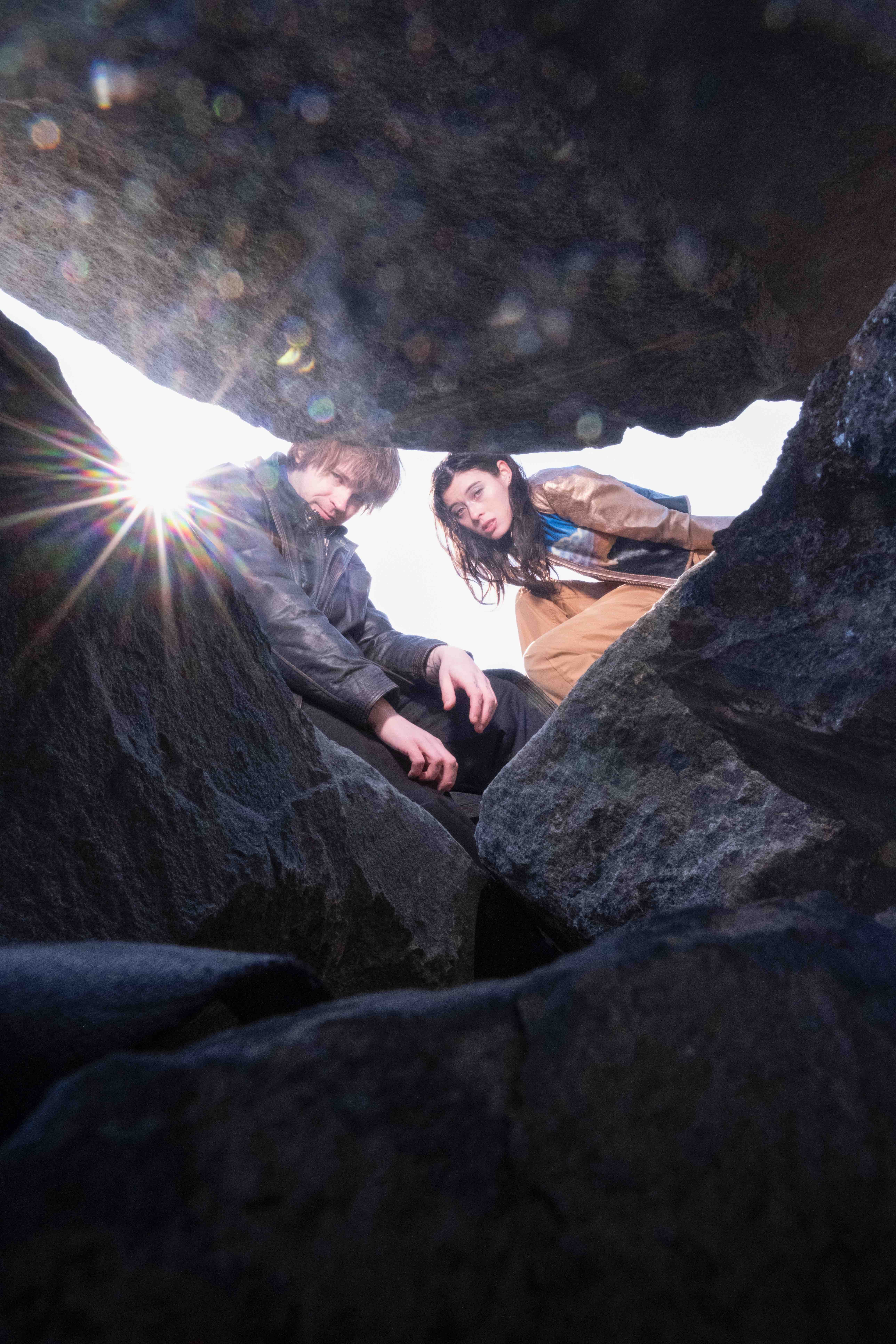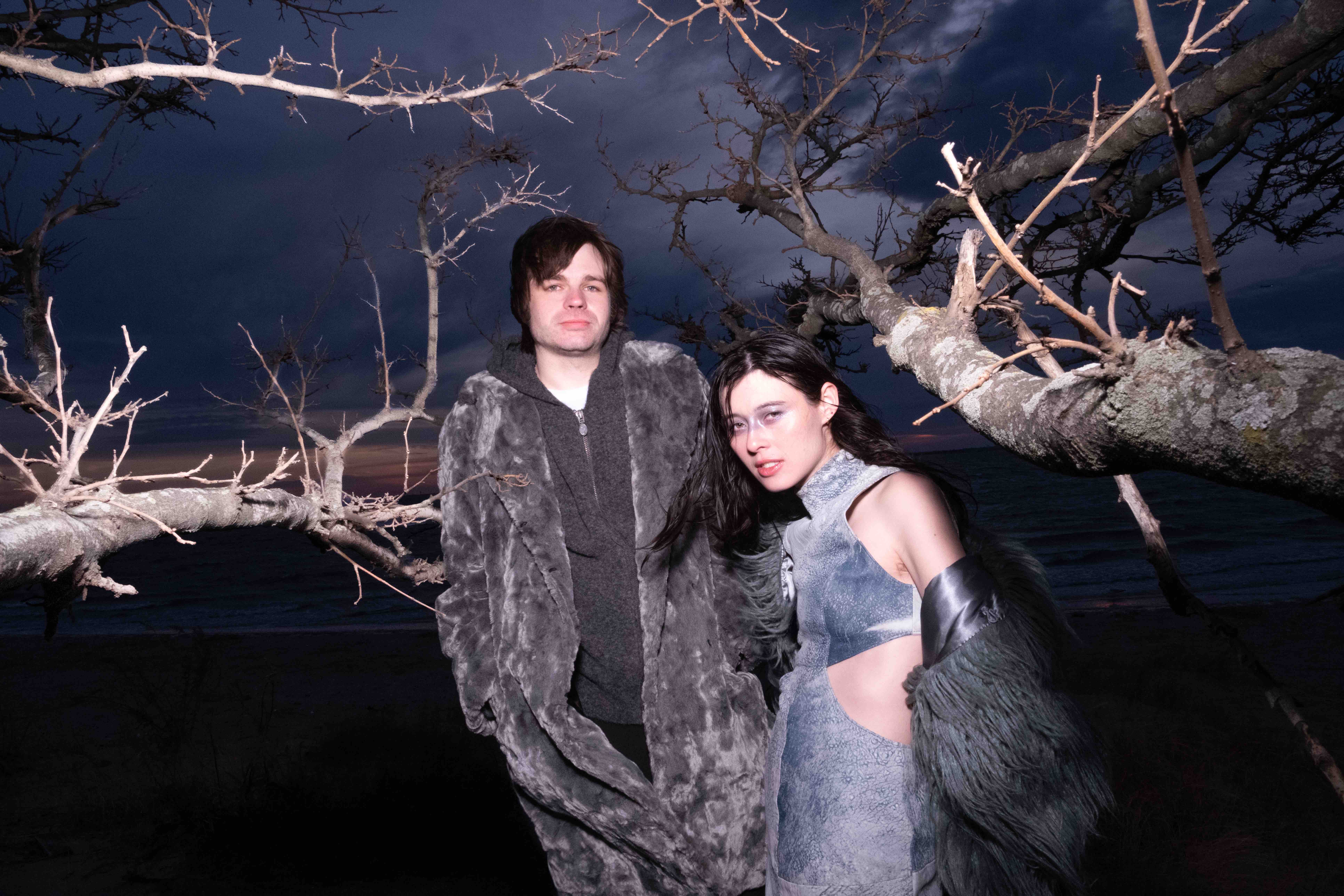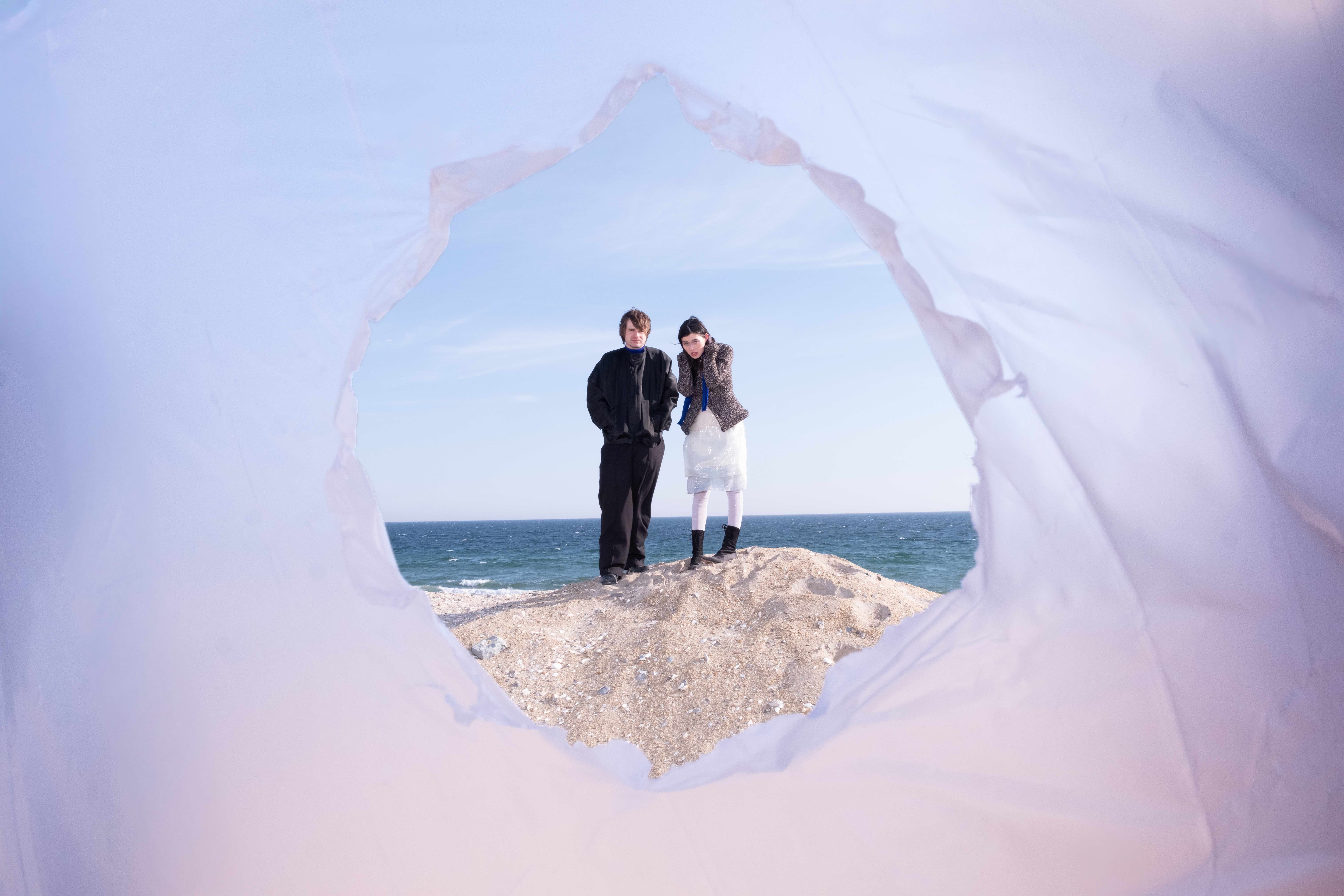F L A U N T


“I wanna play a show for a bunch of dogs.” Nate Amos of off-kilter indie rock band, Water From Your Eyes tells me. With bandmate and lead singer Rachel Brown, the Brooklyn-based two-piece just released their junior album, It’s a Beautiful Place, under powerhouse label Matador, and are about to embark on their North America and Euro tour.
And for Water From Your Eyes, even amidst the noise and the proverbial barks of their everyday life, what inevitably surfaces is an attempt to understand their place in the world—to experience fleeting moments of connection and meaning, and to witness how quickly those moments can vanish. Their new record unfolds as a plea to embrace this transience, sonically building from the sweetly fractured tendrils of their 2021 Structures and anticapitalist snippets of 2023’s Everyone’s Crushed. Where Structure introduced a bendy constructed pop sensibility and Everyone’s Crushed embraced dissonance, tension, and cheeky absurdism, the latest album stretches both extremes further apart. With It’s a Beautiful Place, the band’s humor is still there, but it’s deeper, darker, and existential. Less eager to resolve contradictions, their meanderings feel more deliberate than impulsive. Often resisting the framework of traditional melody, Nate and Rachel find a philosophy where disorder can be the raw material for harmony.
“Figuring out the melody is kind of a puzzle because I'm a firm believer that you can take the most illogical backing track, and then, with the right melody, unlock it and turn it into a pop song. So it was kind of like the creation of chaos,” Nate shares. “And then you have to carefully design a melody that puts everything into perspective and makes it make sense in its own way. So it's kind of trying to decipher a code with the right key. Everything will begin to make sense, and that's kind of the function that melody serves in this context.”
In “Life Signs,” gripping bass winds its way into relentless strings that twist and shift beneath lyrics that read like poetry, giving a sense of tension and release. Then comes the lush glow of “Night Armor,” where layered guitars ascend before giving way to a dancepop rush of “Playing Classics,” whose buoyant melodies turn abstraction into movement. In these moments, meaning lives in the fragile space between what is intended and what is felt, shaped as much by the gestures and the contingencies of perception. Rachel shares, “I feel like we both have our own feelings about what the song is about. That also allows people to have their own feelings about what the song is about as a listener, because it's already kind of like abstracted or refracted or something that kind of allows it to take on more than one meaning.”

In the 1974 anarchist utopian sci-fi novel, The Dispossessed, the notion of utopia is framed as more of a process than a destination. Admittedly, Rachel says that they “actually didn't finish the book yet,” but still band seems to have found meaning in not having a fixed endpoint. Rachel continues, “I guess if you're somewhat focused on the product, rather than the process, then you probably always end up disappointed, and you'll miss the important things of creating, in which you're learning what is working and what isn't.” But that’s often easier said than done, since we as humans tend to move faster, or at least pretend to, than the time it actually takes to learn and grow. And is there time left to save what we already have? Does Water From Your Eyes believe in the American Dream? The question almost feels too big to ask.
“I think that the American Dream was never meant to be fulfilled by most people,” says Rachel, whose grandmother grew up in China during the Japanese occupation—a time marked by war, scarcity, and survival. After immigrating to the US, their grandparents opened a laundromat and later a restaurant, navigating both opportunity and exclusion. “She told me once when I got into college, ‘Rachel, I didn't have food growing up. You'd better make your college education worth it.’ And I was like, ‘Oh my god.’ I was 18 and was like, ‘Man, I'm going into the arts.’ I think a lot of people who do come here, like my grandma for instance, life for her is so much better here than I think it would've been. She was able to build her own business and her own wealth that she just didn't have to begin with. But I also still think it's all bullshit. I think that the American Dream relies on us all believing that it's possible to achieve it if we quote unquote, ‘work hard,’ but it's only if you're lucky, [only] if the people who are in power think that you deserve it.”
In the end, the American Dream isn’t something WFYE affirms or denies, but perhaps interrogates. With It’s a Beautiful Place, survival and striving, possibility and disillusionment all reverberate, carrying the echoes of promise as it buckles and cracks into their music. But, at the root of it all is an inherent hopefulness sewn into its seams, finding solace within the noise.
Last year, when speaking to me about his solo project, This is Lorelai, Nate mentioned being consumed by the music. But now we find him in another place. “I think a lot of it, it honestly probably just has to do with sobriety and having more hope for the future. Different things that are possible. ‘Cause I think, in a weird way, my fixation on music, even if it was kind of a state of hyper productivity, was kind of rooted in a sense of hopelessness and using music as a distraction. So, I think proving to myself that I had the ability to change has yielded a reorganization of my hierarchy of priorities, and while I still tend to be very focused on music and whatever I'm writing at a given time, it kind of functions more as a part of my life rather than a distraction from it.”

For Water From Your Eyes, the weight of the world isn’t a distant concept and hope is not a lofty ideal or fleeting feeling. “I feel like at a certain point, you have to keep going. To not keep going is, like, such a selfish thing to think you can do when so many things have to come together. To act like it's too much for me to bear is such a cowardly thing to do. And especially when you have people in your life rooting for you, it's kind of like you can't really—I can't really—give up,” Rachel admits. “But for me to be sitting in New York in an interview about our album that's gonna come out, being like, ‘I just can't maintain hope’ when there are literal people starving in Sudan and Gaza. There's people who have, been living through wars, and even people in this country who deal with homelessness or different kinds of oppression that I'll never understand. For me to not think that it's possible to get through a day, that's kind of crazy.”
So I must ask: Why make music in a world that is falling? What is the point of it all? Their instrumental track, “You Don’t Believe in God?” does not offer an answer. But this time, Nate does: “I think this goes back to the religion theme, and it's like, is there actually some higher order in the context of which all those things actually do, like literally matter in a great way? Or is the fact that those things matter an artifact of the fact that somehow we became conscious, and we're just trying to make sense of it? I think both those possibilities are beautiful in their own way, as long as you choose to acknowledge that one way or another, these things do matter, rather than the alternative being deciding that they don't matter. As long as you decide that they do matter, you're on the right track.” Rachel concludes, “When you're choosing whether or not to be kind or cruel, I think it's important to remember that everything does matter. I think it's like finding the balance of where you're putting your energy.”
With It’s a Beautiful Place, the band is simply saying: Water From Your Eyes Wuz Here. It’s a declaration that they occupy this space and time fully, even if it’s beautiful or not. It’s a final reminder that meaning is not something we inherit, but something we carve out through attention, intention, and the willingness to remain.